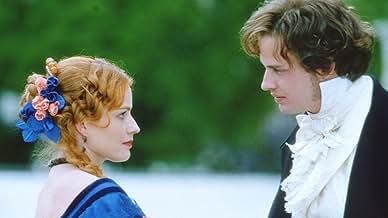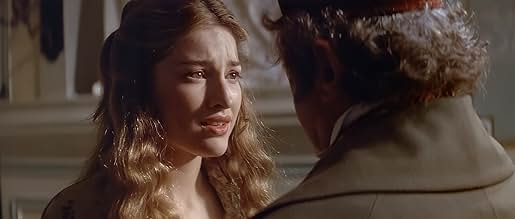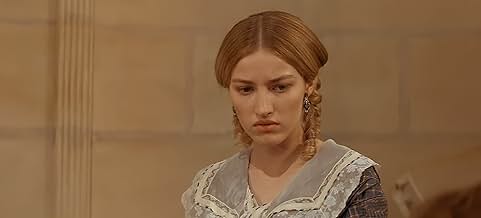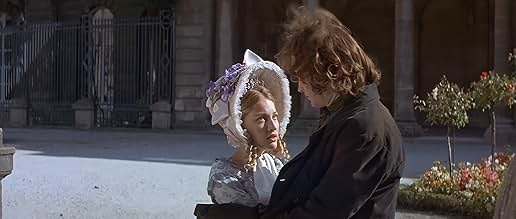Añade un argumento en tu idiomaWhen her sister dies in 1846, Bette moves from the château to Paris to work as a theater seamstress. She helps a handsome, starving artist. When her niece lures him away from her, she plans ... Leer todoWhen her sister dies in 1846, Bette moves from the château to Paris to work as a theater seamstress. She helps a handsome, starving artist. When her niece lures him away from her, she plans a devious revenge.When her sister dies in 1846, Bette moves from the château to Paris to work as a theater seamstress. She helps a handsome, starving artist. When her niece lures him away from her, she plans a devious revenge.
- Premios
- 1 premio y 1 nominación en total
Argumento
¿Sabías que...?
- CuriosidadesAccording to his diaries, Alan Rickman turned down a role in this film
- Citas
Mlle. Elisabeth 'Bette' Fisher: For the sake of their pleasure, men commit the most appalling crimes.
- Banda sonoraThe Other Side of Heaven
Performed by Elisabeth Shue
Music and Lyrics by Danny Troob and Des McAnuff
Adapted from the music of Jacques Offenbach
Produced by Simon Boswell
The story is set in the Paris of the 1840s. Bette Fischer is a middle-aged spinster who works as a theatrical costumer. She is not well-off financially and lives in a sparsely-furnished apartment, although she has more elevated social connections; her cousin Adeline, who dies at the beginning of the film, was married to the influential Baron Hulot. Bette, however, had little love for Adeline, as she was jealous of her cousin's beauty and of her marriage to a successful man. She falls in love with Count Wenceslas Steinbock, a young Polish sculptor who lives in the same apartment block, but loses her sweetheart to Adeline's pretty young daughter Hortense. Bette's dislike of the Hulot family now turns to hatred, and she plots her revenge. She forms an alliance with Jenny Cadine, an opera singer-cum-courtesan and a former mistress of the Baron, who has given her up in accordance with his wife's dying wishes. Jenny, with Bette's encouragement, tries to ruin the happiness of the young couple by seducing Wenceslas away from Hortense.
Those who are familiar with Balzac's novel will realise from the above summary that the film does not stick closely to its plot. Adeline, for example, dies at the very end of the novel, not at the beginning. The real villainess of the novel is not Jenny (who plays only a minor part) or even Bette (who is portrayed as pitiable as well as spiteful), but Valerie Marneffe, the scheming, hypocritical, gold-digging and thoroughly corrupt middle-class housewife who becomes the mistress of Hulot, Wenceslas and several other men. Valerie does not appear in the film at all; nor do Hulot's other mistresses. The film concentrates on the relationships between Bette, Wenceslas, Hortense and Jenny; Hulot, a major figure in the book, becomes less important in the film. The ending of the film, in particular, seems unsatisfactory. There is a confused attempt to tie the story of the Hulot family in with the revolution of 1848, an event that had not even taken place when the novel was written in 1846. This was probably inspired by the standard school textbook idea that the French Revolution represented a corrupt aristocracy getting its just deserts, but this interpretation seems to confuse the events of 1848 with those of 1789, and it is not one that is likely to have appealed to the conservative monarchist Balzac. The replacement of the constitutional monarchy of the amiable 'Roi Citoyen' Louis-Philippe with the regime of the unscrupulous adventurer Napoleon III was not the most glorious episode in French history.
Like some other reviewers, I felt that some of the roles were miscast. Jessica Lange, even in her late forties, was far too attractive for the role of the dried-up, embittered spinster Bette. (Balzac chose the name because of its similarity to the French word 'bete', meaning 'beast'). Bette's driving force is sexual jealousy of the beauty of other women, particularly of Adeline and Hortense, but Miss Lange's character is not a woman who would need to feel jealous of anyone. Kelly Macdonald's Hortense seemed too insipid. Hugh Laurie, in his late thirties at the time the film was made, was far too young for the role of Hulot. The character envisaged by Balzac was probably in his sixties and the father of two adult children. (Hortense has an elder brother, Victorin). Laurie, better known in Britain as a comedian than as an actor, plays Hulot as a largely comic figure, whereas in the novel he is a tragic one, a distinguished public servant ruined by his sexual passions and his financial improvidence.
The book forms part of the sequence of novels which Balzac intended as a close examination of French society and to which he gave the title of 'La Comedy Humaine'. Despite this title, most of the individual novels, 'La Cousine Bette' among them, are deeply serious rather than humorous, but the filmmakers here seem to treat the story as a black comedy. On the whole, in fact, this approach works well. The story moves along at a brisk pace, helped on its way by some witty songs. The title of one of these, 'Love is the Master, You are the Slave', is perhaps the best encapsulation one could wish for of the film in a single phrase; most of the characters are enslaved by their sexual desires. Jessica Lange may be physically wrong for the part, but she nevertheless throws herself into her role with gusto and makes a splendidly hissable pantomime villainess. Elisabeth Shue's singing voice is not really strong enough to make her convincing as an opera singer, but she is well able to convey Jenny's seductive charms. Unlike some, I found no difficulty with the fact that Bette and Jenny had American accents; both, after all, were originally peasant girls from Alsace-Lorraine (Bette's surname implies that her native language is probably German rather than French) and would not have spoken French with the Parisian accents of the other characters. There are some good performances in minor roles; Toby Stephens makes a suitably dull and priggish Victorin, a man who is the complete antithesis of his father, and Bob Hoskins is in superb form as the greasy businessman Crevel. The name is derived from 'crever', meaning to burst, and Hoskins's Crevel is a man positively bursting with his own self-importance. The film may take liberties with Balzac, but on the whole it is an enjoyable one which works reasonably well in its own right. 6/10
- JamesHitchcock
- 16 dic 2004
- Enlace permanente
Selecciones populares
- How long is Cousin Bette?Con tecnología de Alexa
Detalles
- Fecha de lanzamiento
- Países de origen
- Sitio oficial
- Idioma
- Títulos en diferentes países
- Cousin Bette
- Localizaciones del rodaje
- Empresa productora
- Ver más compañías en los créditos en IMDbPro
Taquilla
- Recaudación en Estados Unidos y Canadá
- 1.295.194 US$
- Fin de semana de estreno en EE. UU. y Canadá
- 76.488 US$
- 14 jun 1998
- Recaudación en todo el mundo
- 1.295.194 US$
Contribuir a esta página



































